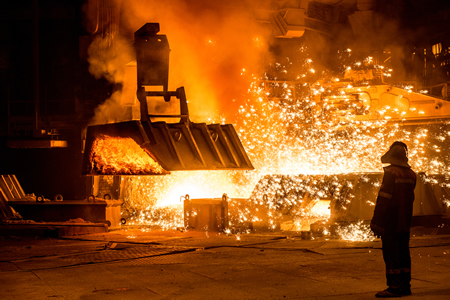[breadcrumb]
 What is a Blast Furnace Operator?
What is a Blast Furnace Operator?
A blast furnace operator is under the broader career category of metal-refining furnace operators and tenders. These furnace operators work with a variety of furnaces, including gas, coal, oil, electric, open-hearth or oxygen. They melt and refine metal before casting or in order to produce certain types of steel.
Typical job duties of these professionals include:
- Repair and maintain electric equipment
- Calibrate, repair and finetune machines, devices and equipment
- Regulate and test machines, devices and equipment
- Handle and move objects to install, position and manipulate them
- Control machines and electronic devices
- Operate mechanized devices and navigate vehicles and other transportation devices
- Use control mechanisms to operate machines or processes
- Inspect equipment, structures and materials to identify the reason for errors or defects
How Can a Blast Furnace Operator Get Mesothelioma by Occupational Exposure to Asbestos?
Blast furnace operators were at risk of being exposed to asbestos because asbestos was often used in insulation and other products that they interacted with on a daily basis. Furnace operators often worked in areas with extremely high temperatures. Additionally, they were often responsible for maintaining heavy-duty equipment that was used to melt and refine metals. Asbestos was often used because of its fire-retardant qualities and was found in common environments where furnace operators worked.
Asbestos was often included in insulation used in furnaces, including asbestos board and spray-on insulation. Additionally, binding agents that were used to keep materials together for smelting contained asbestos dust and other materials.
Furnace operators may have come in contact with these asbestos materials when they assembled, cleaned, inspected or removed furnaces. When asbestos is crumbled, it becomes airborne and can be ingested or inhaled by anyone in close proximity. These routine job duties often disturbed asbestos and placed the workers at risk for breathing in these deadly fibers that lead to mesothelioma. Furthermore, these operators often worked in furnace or smelting rooms that were poorly ventilated, which further increased the amount of asbestos in the air.
Asbestos was also used in the personal protective equipment that was designed to keep furnace operators and other workers safe from fire and high heats.
Many furnaces last several decades, so furnace operators that work on repairing old furnaces or removing them from older buildings may be at risk of being exposed to asbestos to this day.
Locations in the United States for the Highest Employment Rates for Blast Furnace Operators
According to the U.S. Bureau of Labor Statistics, there were 17,610 metal refining furnace operators and tenders employed in 2017. The states with the highest employment rates for these professions include:
Similar Occupations as Blast Furnace Operators
Similar occupations as blast furnace operators include:
- Heat treating equipment setters
- Operators
- Tenders
Lawsuits and Settlements Involving Blast Furnace Operators and Mesothelioma
While there are not many known asbestos lawsuits brought by former blast furnace operators, the results of confidential settlements that are reached pre- or post-filing of a lawsuit are kept private. Many companies have been sued due to failing to warn workers and consumers of the dangers of asbestos in the products they handled, sometimes resulting in multimillion-dollar verdicts for single plaintiffs or groups of similarly affected individuals.
Studies Related to Blast Furnace Operators and Asbestos
While there are limited studies related to the specific job of blast furnace operators and the link to asbestos, there have been countless studies that have explored the connection between asbestos exposure and mesothelioma. These studies show that many decades after initial exposure to asbestos, mesothelioma symptoms may arise. Mesothelioma instances are highest for people who worked in industrial settings, especially those where there was not much ventilation.
Types of Asbestos Products Used by Blast Furnace Operators
Blast furnace operators often worked around a variety of furnace types and around products that contained asbestos. Some products that may have exposed them to asbestos include:
- Adhesive furnace boiler cement
- Furnace sealant paper
- Smelter
- Furnace spray
- Furnace tubes
- Varnish
- Asbestos furnace cloth
- Insulation
- Blast furnace blowers
- Ovens
- Binding agents
- Sealants
Manufacturers of Asbestos Products Used by Blast Furnace Operators
Manufacturers of asbestos products used by blast furnace operators may include:
- Lebanon Blast Furnace Company
- LS Blast Furnace Div.
- McLouth Steel Blast Furnaces
- Minnesota Blast Furnace Company
Steel mills and other companies across the country where blast furnace operators, metal-refining operators and tenders may have worked that could have exposed them to asbestos include:
- AK Steel
- Allegheny Ludium Steel Corporation
- Ameristeel
- ARMCO, Inc.
- Bayou Steel Corporation
- Bethlehem steel Company
- Birmingham Steel Corporation
- Bohler Steel
- Carley Foundry, Inc.
- Clingan Steel, Inc.
- Commercial Metals
- Crucible Steel Company of America
- Dotson Company, Inc.
- Electralloy
- Ensley Steel Works
- Granite City Steel Company
- Gulf States Steel Company
- Ispat International
- J&H Power Group, Inc.
- J&L Specialty Steel
- Keystone Steel & Wire
- LTV Steel
- Marion Steel Company
- McDonald Steel
- National Steel
- Northwestern Steel & Wire
- Oregon Steel Mills, Inc.
- Plymouth Steel
- Quality Tubing Inc.
- Rome Strip Steel
- Rouge Industries, Inc.
- Sheffield Steel Corporation
- Sloss Industries
- Sloss Sheffield Steel and Iron Sloss Mines
- Steel Resource
- Titan Steel Corporation
- Trussbilt
- TXI Chaparral
- USX Corporation
- Weirton National Steel
- Wheeling-Pittsburgh Steel Corporation
